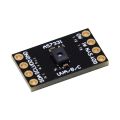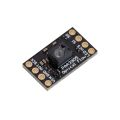Ladybug STM32L432 Development Board
- Buy 5 for $16.20 each and save 10%
- Buy 10 for $15.30 each and save 15%
Ladybug STM32L432 Development Board
Simple design, easy to program, high-performance and ultra-low-power embedded solution
**Technical Specifications:**
- Microcontroller: STM32L432 ARM Cortex M4F
- Clock speed: 1, 2, 4, 8, 16, 24, 32, 48, 64, 80 MHz
- Operating voltage: 3.0V
- I/O pin limits: most pins 5.0 V tolerant, 20 mA
- Digital I/O pins: 13, with 8 PWM
- Analog input pins: five 12-bit ADC channels
- Analog output pins: two 12-bit DAC
- RTC: 1 ppm accuracy
- Flash memory: 256 KB SRAM: 64 KB
- Voltage regulator: 3.3-5.5V input / 3.3V, 150 mA output
- Dimensions: 1.1 x 0.6"
Ladybug (0.6" x 1.1") is a small, low-cost development board with simple, open-source design that will allow just about anyone to make use of the STM32L4 in their own custom applications. Ladybug relies on a single, inexpensive 32.768 kHz crystal oscillator and doesn't require the ST-Link built in to the STM32 Nucleo boards. Applications can be developed using the Ladybug development board, which provide access to all GPIOs and peripherals of the STM32L4. When the application has been sufficiently proved out, application-specific hardware can be designed using the STM32L432 development board as a design template. The 5 mm x 5 mm QFN32 package of the STM32L432 (Ladybug) is space-efficient, low-cost but a still powerful solutions to embedded computational and sensor management problems. Better still, the rich set of low-power modes allows very long battery life in remote and wearable applications.
Here is a github repository with example Arduino sketches and here is where you can find the Arduino core for the Ladybug.
We designed Ladybug for small LiPo battery operation. There is a port for a JST battery connector on the board as well as a Vin at the board edge that connects to the battery anode so peripherals like haptic motors or displays can be powered directly from the battery, or the board can be directly powered from Vin.
We chose the smallest form factors for the boards to enable use for wearable applications. Ladybug is smaller than most single-cell LiPo batteries!
We chose the TPS7A0233 200 mA 3V0 LDO because it has a quiescent current of only 65 nA. The STM32L432 Ladybug uses only 2.4 uA in STOP mode!
These are simple development boards to build and use, but we put a lot of thought and features into their design:
(1) Fully-functional USB programming (not indirect through a UART bridge); hence USB/CDC, USB/MSC and USB/HID are supported . USB/MSC means drag and drop files to/from any SPI flash attached to your Ladybug from/to your pc!
(2) No complex software setup needed to deal with ST-Link or JTAG debuggers. Simple Arduino IDE integration via USB/DFU.
(3) Logical pinmap to comply with the Arduino UNO / Arduino Zero while adding additional UART/SPI/I2C peripherals in a consistent way. (STM32L432 Nucleo exposes one UART/I2C/SPI port each to the user).
(4) RESET & BOOT buttons for ease of use with traditional tool chains.
(5) Very low power operation (not possible with Nucleo as the ST-Link is on the same PCB and without it, functionality is seriously limited)
(6) Tiny form factors, ideal for wearable applications
(7) Open Source. Simple and easy-to-build hardware designs and easy to use with any software layer (try using an Arduino Zero without an Arduino IDE!)
Ladybug is open source so you can use the design any way you want. Have some pcbs made at OSH Park and assemble some of your own, or order the assembled and tested Ladybug Development Boards here and see how easy it is to get the power of a Cortex M4F MCU working for you!

 United States
United States 







